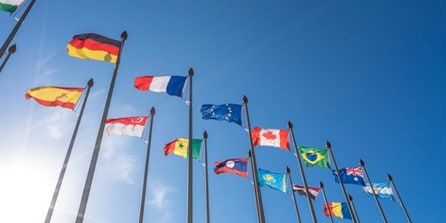Planning a meeting with guests from around the world
When delegates are willing to travel, rather than relying on a conference call, it opens up new opportunities for your business.

International event planning can potentially take you outside your comfort zone, particularly if it’s the first time. Successfully navigating the social and cultural factors that don’t normally occur at inhouse meetings can be a daunting task.
As with every meeting, careful planning is the key. Let’s say you’re tasked with planning a conference with guests from several different countries: where do you start?
Choosing a venue
Data published in December 2022 revealed 85 million people had attended meetings in the UK in the past 12 months. Corporate events accounted for 35% of the total visitor economy.
London is continually regarded as the number one city in Britain to host meetings and events, thanks to the capital being the nation’s business and financial hub.
The business events sector is diverse, covering conferences, trade fairs, entertainment events and business tourism. Business trips accounted for 21% of all visits to the UK, with 8.7 million such visits taking place, contributing £4.8 billion to the economy in delegate spending.
London has continued to dominate in terms of the number of visits and associated spending, according to data from Visit Britain.
Choosing meeting rooms in London brings its obvious advantages: no other city in the world matches the capital for its wealth of rich heritage and culture. With a great variety of cuisine, entertainment and music, plus 233 different languages spoken, the city’s diversity provides a friendly welcome for everyone. Your business will benefit from meeting delegates face-to-face in a vibrant city by creating a positive image of your brand.
When it comes to meeting and training rooms, London has the top technology. Did you know, London has an average internet speed of 119 Mbps – around 7% higher than the UK national average of 111 Mbps? This means there won’t be any awkward lagging with presentations or video conferencing for those who can’t make it in person.
Here are a few tips you might find useful when planning a meeting with guests from around the world.
Agenda
Posting documents in advance is a best practice for any meeting, but it’s particularly important if your delegates aren’t native speakers of the same language. Give people enough time to read or translate crucial documents, such as the agenda and if any written information is being handed out during the meeting, make sure it’s already translated into the native languages of all participants.
Adapting for different languages need not be complex. A multilingual meeting can be managed to ensure all participants are able to understand and contribute. Have interpreters or a designated translator present at the event who are able to translate in real-time.
Another option is using technology, such as translation apps or software, to translate written or spoken language. This will enable everyone to understand and communicate during the meeting.
It’s important to create an inclusive and respectful environment, so that everyone feels welcome and comfortable while expressing themselves.
Respect other cultures and make sure every delegate can ask for clarification if needed, without feeling awkward. One simple way of putting people at their ease is by doing some cultural research online to find out how to greet business contacts from around the world. Read up on cultural etiquette and business practices for people from all the business destinations who are attending your meeting.
If some of the delegates are joining you via video link, use text chat too, as this will allow native language discussion, either as a group or one-on-one. This can encourage greater camaraderie and take the edge off any initial nerves.
Catering requirements
It goes without saying that everyone’s catering requirements should be respected. Prior to the meeting, find out whether delegates have specific dietary needs for either health or cultural reasons, such as vegan diets, dairy-free options, or not eating certain foods for religious reasons.
There are also plenty of places to dine out in London that cater for every dietary need imaginable. Do your research thoroughly in advance, so you can advise international visitors on the best places to stay, eat, drink and socialise after the conference.
Travel connections
Another advantage of choosing London for a meeting is that it has the best travel connections in the world. With six international airports hosting arrivals from more than 160 cities worldwide; there is also the Eurostar from Paris and Brussels arriving at St Pancras International station, offering a further travel option for European business visitors.
Professional partner
A local partner for international meeting planning is possibly the most important step of all – choose a professional organisation with local knowledge, experience and expertise to ensure your event is an even bigger success when it comes to fine-tuning the planning.
Although it may seem challenging to meet in person with guests from different countries, it will be well worth the extra effort, as they will return home with a positive and lasting impression of your brand.
Share this post
Tags
- Career Development
- Celebrity Meetings
- Conferences
- Confidence
- Exhibitions
- Historic Meetings
- How to Interview Effectively
- Human Resources
- In The Press
- Meetings and Conferences
- Monarchy
- News
- Our Team
- Personal Development
- Personnel
- Presentation Techniques
- Teamwork
- Top Tips for Meetings
- Training & Workshops
- Video Conferences



